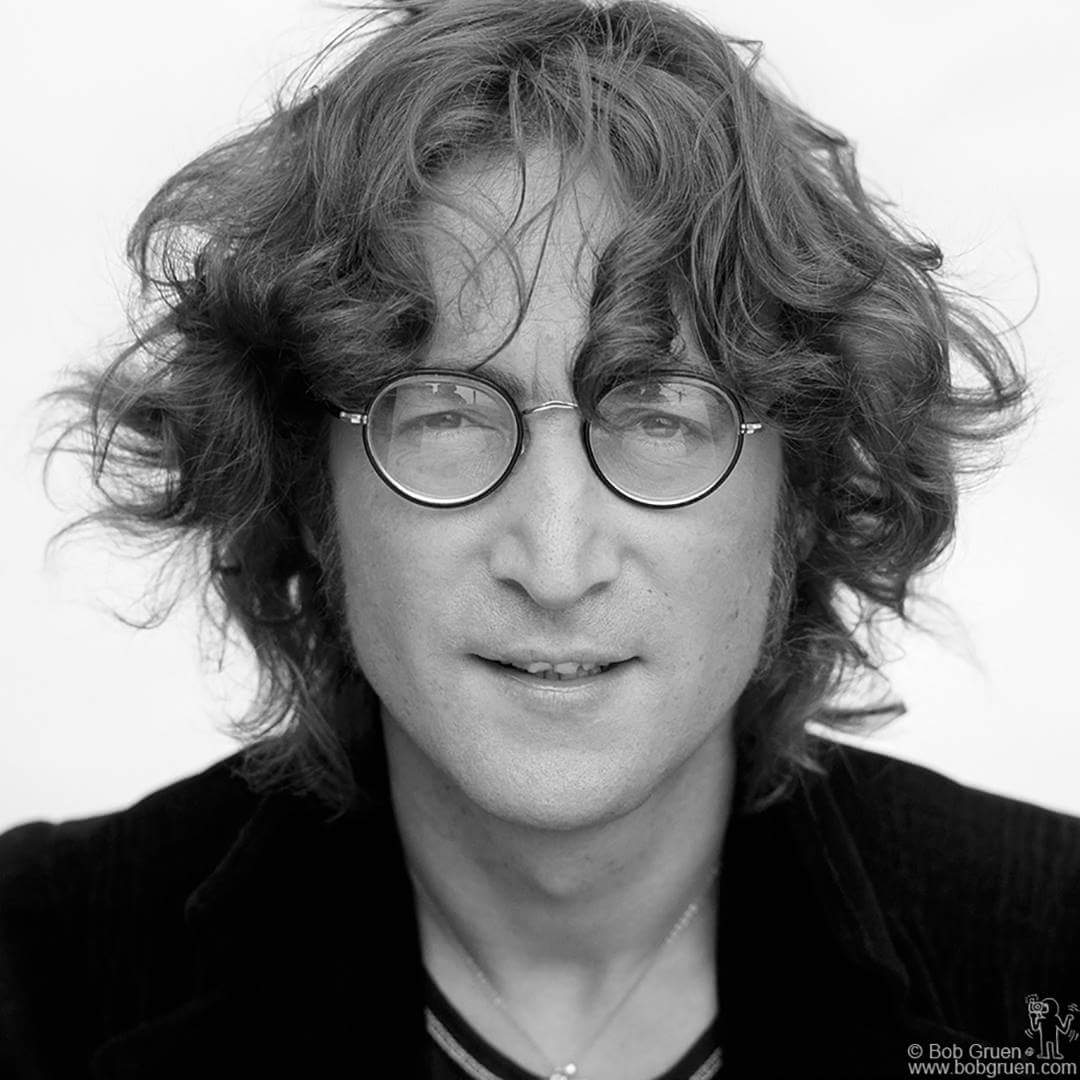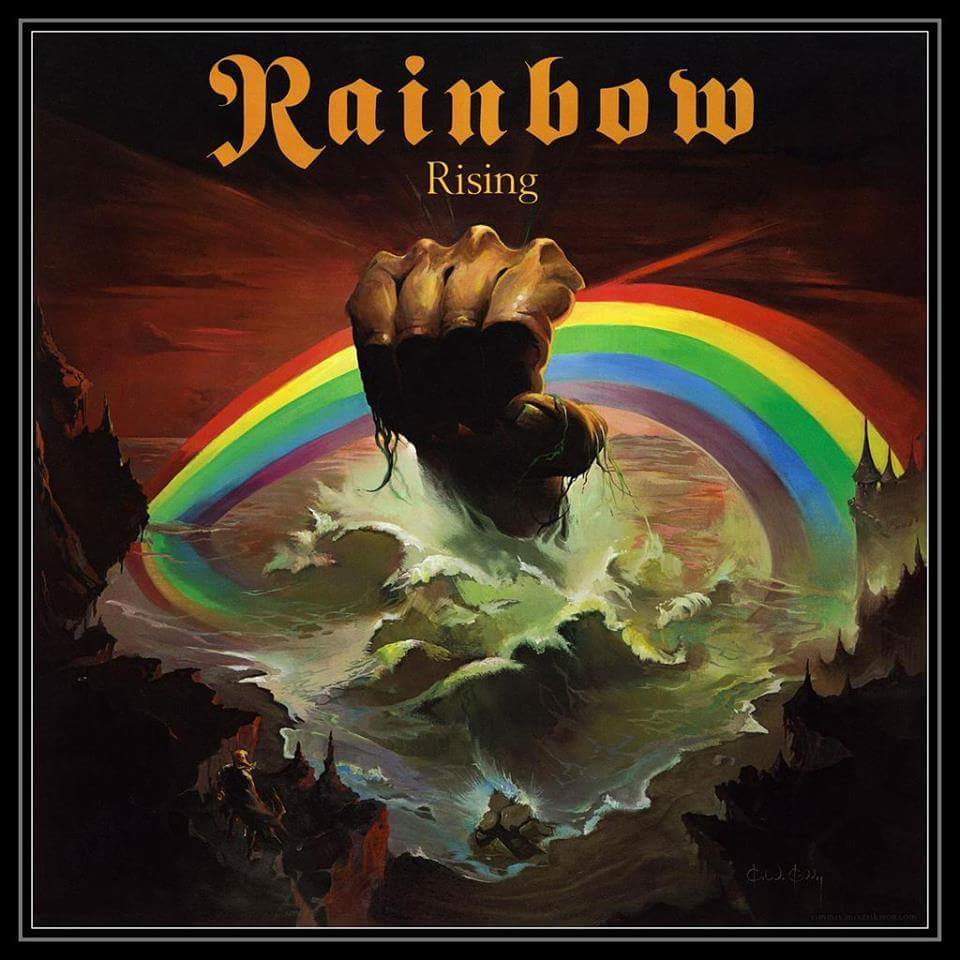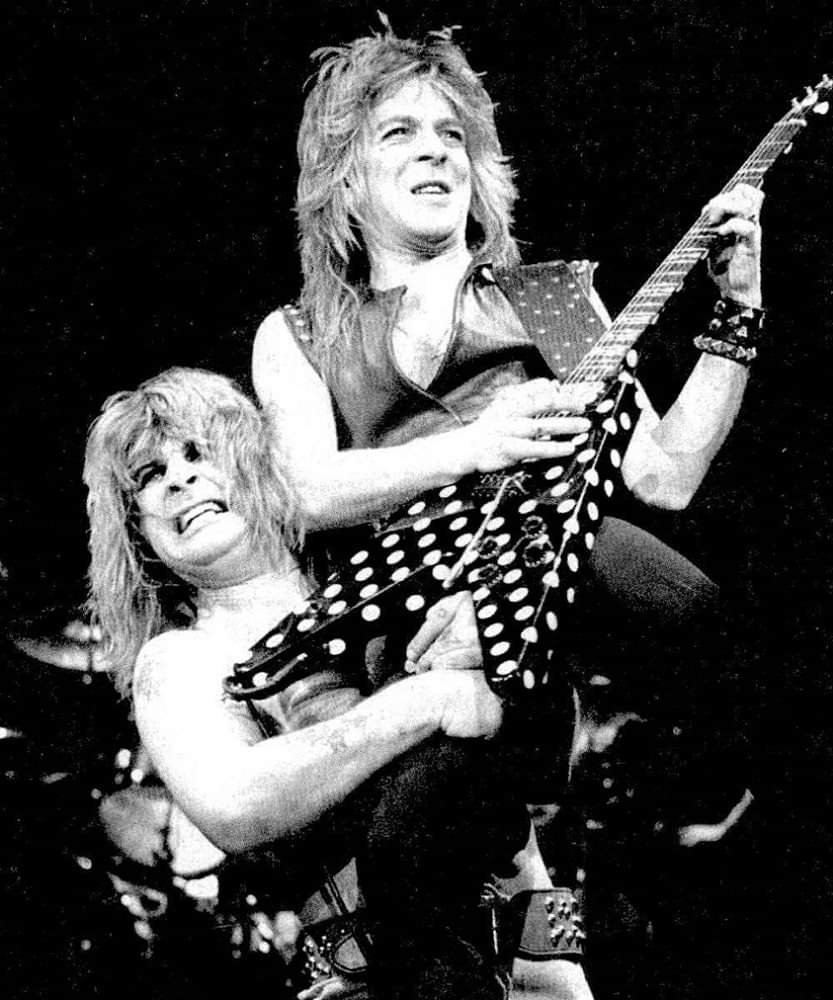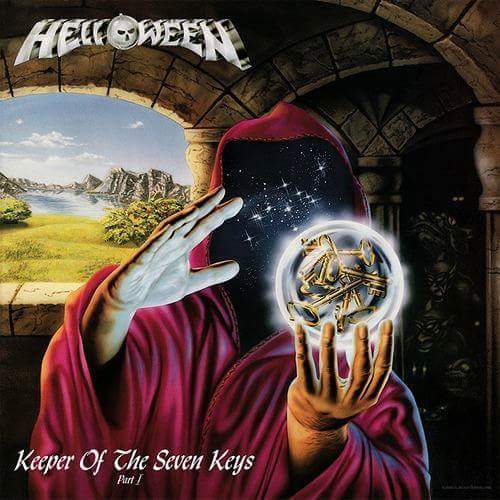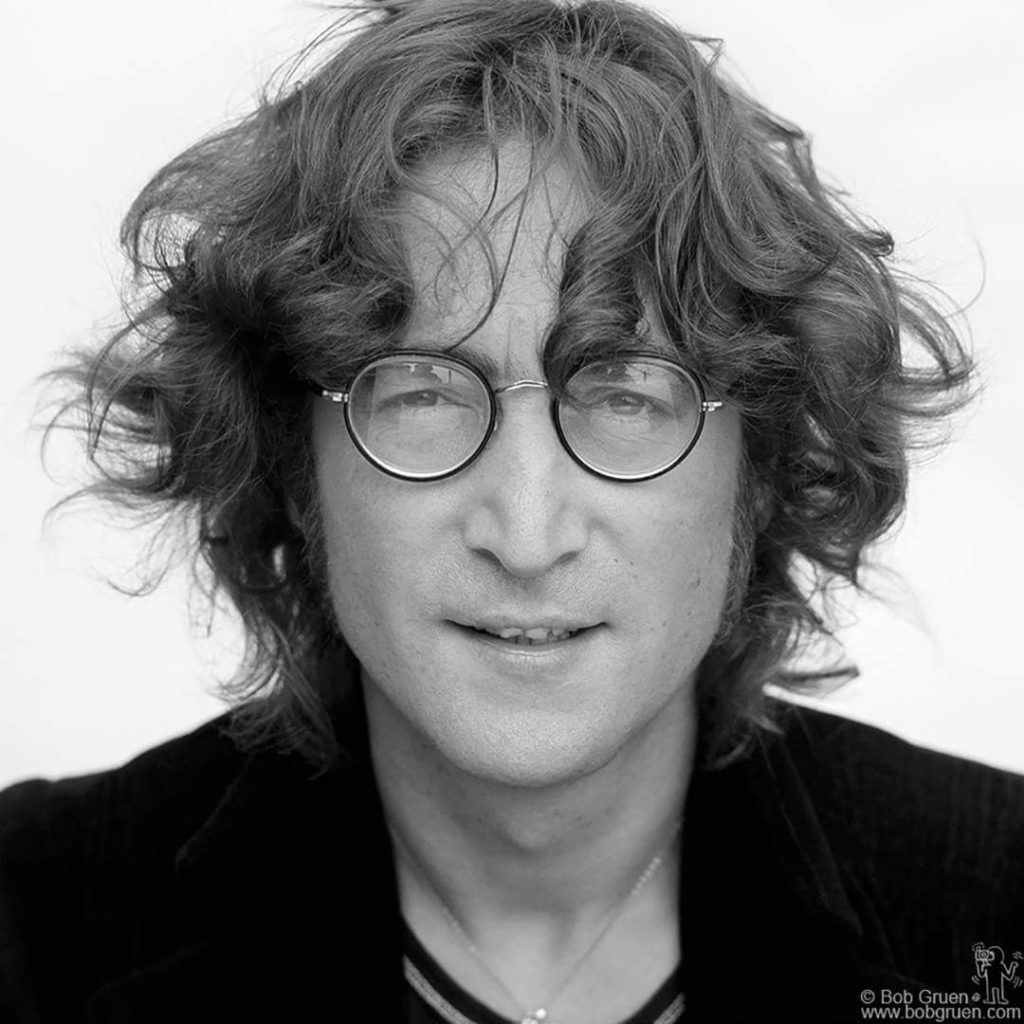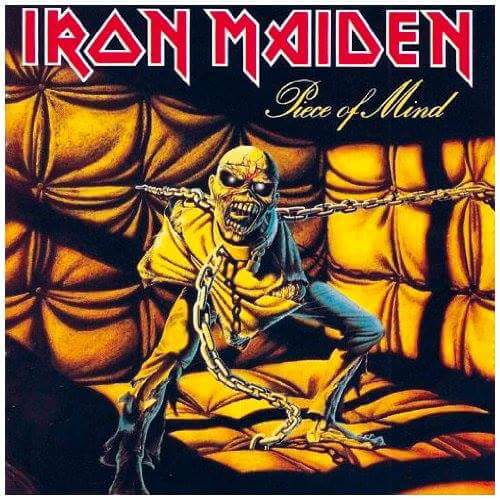The 50 greatest singers in rock history. At least, the 50 greatest rock vocalists that most people have heard of. What makes a singer great? How can a singer of one era be judged against a singer of another? How does one judge between singers of different genres? Rather than answer those questions, let’s talk about what this list is NOT.
This list is NOT a pop list and it’s not who has accomplished the most or who was the most significant. (Otherwise Prince and Michael Jackson would probably have made the list). It has NOTHING to do with popularity or a singer’s influence on others (or Mick Jagger, Bono and Paul Stanley would have made the list). It matters NOT how many records the singer’s band sold (or Paul and John would be 1 & 2). It has nothing to do with charisma (otherwise Jim Morrison, Bob Marley and David Lee Roth would have made the cut). And, the list considers a singer’s entire career, not just the highlights. Simply stated, this is a list of 50 great voices, predominantly from the rock, hard rock and heavy metal genres.
Some fantastic and deserving singers were left off the list due to nothing other than anonymity. There’s no need to create a list (and subsequent story) containing a bunch of singers no one knows. For those deeply dedicated to the pursuit of great, obscure bands that never achieved mainstream status, just know that stellar vocalists such as Mike Tirelli (Jack Starr), Todd Michael Hall (Riot V), Tommy Heart (Fair Warning), Ted Pilot (Fifth Angel), Andre Matos (Viper), James LaBrie (Dream Theater), Timo Kotipelto (Stratovarius), Russell Allen (Symphony X), Guy Speranza (Riot), Tobias Sammet (Edguy), Roger Manning (Jellyfish) and Greg Anderson (Prizoner) would have otherwise likely been included. With that said, let the debating begin!
- Steve Perry (Journey)
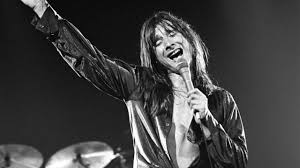
The king of the hill, top of the heap, A number 1. Steve Perry sets the example for what a lead singer should aspire to be. The look, the stage presence and a voice from another world. Perry can sing rock, he can sing ballads, all while being the absolute best at both. The voice of a generation, Perry sings every song like his life depends on it. With that kind of focus, intensity, talent and passion, it’s no surprise that Perry stands alone at the very top of the greatest singers of all time list.
- Robin Zander (Cheap Trick)
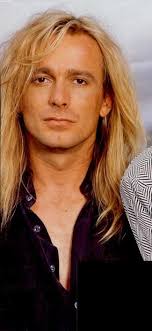
The man with the indestructible voice, Cheap Trick has seemingly been on tour since Columbus discovered America, and yet Zander’s voice is as clean and perfect as ever. With hits spanning four decades, the voice that delivers If You Want My Love, Surrender, Dream Police, She’s Tight and, well, Voices, sets the standard for rock vocalists. Zander is an inspiration, if not outright idol, to vocalists of all generations worldwide.
- Michael Kiske (Helloween)
The singer from the “pumpkins” band, Michael Kiske would – and should – be a household name. Helloween designed the playbook for what a heavy metal band should sound like: high, soaring vocals; intense, dueling guitars, and a rhythm section that touches every one of the body’s senses. But it all starts with the vocalist, and heavy metal has never seen a better one than Michael Kiske. And to imagine, he joined the band at the ripe old age of just 18. Now back in Helloween after a lengthy hiatus, Kiske has also lent his vocal talents to the likes of Place Vendome, Unisonic (with Helloween bandmate Kai Hansen) and Avantasia, among others.
- Bruce Dickinson (Iron Maiden)
The voice of the quintessential heavy metal band, Iron Maiden, Dickinson defines what it means to be metal. Making his debut on the classic Number of the Beast album in 1982, he followed that up with an album considered by many to be the greatest metal album of all time, 1983’s Piece of Mind. With Powerslave to follow, the trilogy showcases Dickinson’s brilliance and separates him from all metal vocalists short of Kiske. With power, an incredible range, and an attitude and stage presence to match, Bruce Dickinson is an iconic heavy metal singer.
- Ronnie James Dio (Rainbow, Black Sabbath)
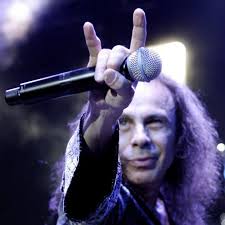
What can you say about a guy that fronted three top line bands? Getting his international start with Ritchie Blackmore’s Rainbow, Dio delivered some of the finest rock classics ever created, including Rising and Long Live Rock N Roll. When Blackmore wanted to go more commercial, Dio left and joined Black Sabbath, replacing the iconic Ozzy Osbourne. All Dio did was smoke Osbourne and take Sabbath to a whole new plateau in the metal world. Finally forming his eponymous band with ex-Rainbow bassist Jimmy Bain, ex-Sabbath drummer Vinny Appice and guitar prodigy Vivian Campbell, Dio delivered three consecutive masterpieces that included metal anthems such as Rainbow in the Dark, Holy Diver, Last in Line and Evil Eyes. The godfather or heavy metal and the inventor of the “metal horns,” Dio was an icon and one of the greatest rock and metal singers who ever lived.
- Brad Delp (Boston)
Rumor has it that once studio genius Tom Scholz was finished recording the music to his debut record and ready to field a band he called Boston, he had to choose between two vocal candidates: Billy Squier and Brad Delp. While Squier is somewhat of a rock god in his own right, Scholz made the right call in hiring Delp. He became the voice of the 70s fronting the top-40 sensation that ruled the radio from 1976 to 1980, and still enjoys regular airplay to this day. Delp’s range could equal just about anyone’s and his ability to lay down harmonies in several octaves created one of rock’s most unique sounds. More Than A Feeling, Peace of Mind, Don’t Look Back and A Man I’ll Never Be showcase the brilliance of one of rock’s greatest voices. Delp also appeared on fellow Boston guitarist Barry Goudreau’s solo album, and the two formed the short lived group RTZ which produced two solid albums that most Boston fans would greatly enjoy.
- Geoff Tate (Queensryche)
When contemplating the “Mt. Rushmore” of metal vocalists, Tate and the metal God, Rob Halford, are neck and neck for the fourth spot (behind Kiske, Dickinson and Dio). While Halford has more longevity, a bigger catalog and a pretty cool nickname, Tate gets the nod due to sheer talent. As great as Halford may be and is, Tate does things that Halford simply couldn’t. Metal anthems Queen of the Reich, Take Hold of the Flame and Prophecy are a testament to that. Yet, the heartfelt ballads, such as Lady Jane, One More Time and Someone Else uncover the true greatness in Geoff Tate’s incredible voice.
- Robert Plant (Led Zeppelin)

Robert Plant is the golden god, the frontman of one of rock’s most iconic bands, Led Zeppelin. The voice behind In the Light, Kashmir, Stairway to Heaven and Dancing Days, Plant set the bar higher than most can reach. His stellar brilliance carried on into his solo career, highlighted by the lovely ballad, “Moonlight in Samosa,” found on Plant’s solo debut, proving the multi-dimensional talent Plant possesses.
- Rob Halford (Judas Priest)
The metal god has been delivering the goods for almost 50 years and he’s as great as ever. The leather, the motorcycles, the shrieks and the high notes, Halford is one of a kind and a trendsetter for the heavy metal generation. The voice behind Living After Midnight, Breaking the Law, Green Manalishi, Electric Eye and You Got Another Thing Coming, Halford delivers strength and energy that perfectly support the dual guitar attack of KK Downing and Glenn Tipton, legends in their own right. Halford has also produced a second band, Fight, and solo records, the zenith being the classic “Resurrection.” He very easily could have made the metal Mt. Rushmore, but just as a fifth stone head appears in South Dakota in the form of Crazy Horse, Rob Halford is the metal Crazy Horse.
- Lou Gramm (Foreigner)
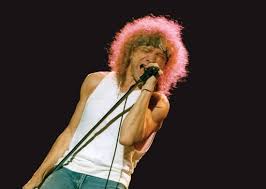
Like Halford, Lou Gramm very easily could have made the rock singers’ Mt. Rushmore. In an era competing with the likes of Journey, Styx, Led Zeppelin and other powerhouse bands, Gramm and his band Foreigner held its own, delivering a jukebox full of hits. With virtually unmatched power and range, Lou Gramm’s voice defines the rock generation of the late 70s/early 80s.
- Freddie Mercury (Queen)
Rock? Check. Opera? Check. Ballads? Check. Bohemian Rhapsody? Absolutely. Freddie Mercury could do it all, and set the standard for what it meant to be a charismatic frontman. Unrivaled energy, an incredible range and a stage presence surpassed by no one, Mercury is an all-time great that delivered his best performances on the biggest stages, including his legendary performance at Live Aid in 1985.
- Dennis DeYoung (Styx)
The theater singer with the most operatic voice in rock, Dennis DeYoung is the perfect counterpoint to bandmate Tommy Shaw’s straightforward rock style, giving the band depth and dimension that other bands can’t match. DeYoung mastered perfect pitch and was the king of the 70s rock ballad, including classics such as Come Sail Away, Babe, Lady and The Best of Times.
- Joe Lynn Turner (Rainbow)
The third voice of Rainbow, and arguably, the smoothest, Turner’s voice was all over AOR radio during rock’s peak years in the early 80s. Stringing together hits such as I Surrender, Can’t Let You Go, Street of Dreams and Stone Cold, it was virtually impossible to turn on the radio and not hear Joe Lynn Turner crooning yet another hit from the machine known as Rainbow. Ritchie Blackmore wanted to go more commercial when he split with Ronnie James Dio and it came to fruition, first with Graham Bonnet, but more so with – and because of – Joe Lynn Turner.
- Rik Emmett (Triumph)
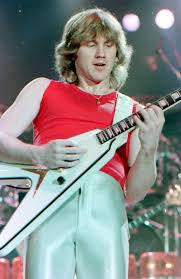
When Triumph came onto the scene in 1976, they were doing everything they could to be the next Rush. Also from Toronto, Canada like Rush, Triumph was a 3-piece band consisting of talented musicians, led by a frontman with an incredibly high voice. The difference between Triumph and Rush is that Rik Emmett could actually sing. He sang his heart out, perfectly in sync with the rise of MTV, which gave the band the boost they needed to become mainstream virtually overnight. Triumph’s sound started to gel with the Just a Game album, but it was the MTV smash Allied Forces that brought them into superstardom, led by hits Fight the Good Fight, Say Goodbye and the timeless Magic Power. The imageless band relied on their talent and their songwriting, which were as good as anyone’s. Sadly, as Andre Agassi can tell you, image is everything, and Triumph faded from popularity as quickly as they achieved it, through no fault of their own, once the hair metal generation came on the scene.
- Paul McCartney (Beatles)

It’s Paul McCartney. The man who created and sang Yesterday, I Will, Let It Be, Hey Jude, Maybe I’m Amazed, Silly Love Songs, My Love, Hello/Goodbye, Helter Skelter, She Loves You, The Long and Winding Road, Here There and Everywhere and countless others. A damn good bassist in his own right, Paul is the ultimate frontman engaging audiences non-stop for almost 60 years. An icon. A legend. The best there ever was at what he does, including being a great vocalist.
- Steve Walsh (Kansas)
When they weren’t trying to fit in another violin solo or six minute long guitar solo, Kansas was at the top of their game, led by frontman Steve Walsh. A man who could crank out rock classics and lovely ballads with the perfect touch, Walsh is the voice behind Carry On Wayward Son, Dust in the Wind, Hold On and the Point of Know Return. The band had hits with his replacement, Jon Elefante, but they weren’t the same. He returned to deliver a standout performance on Power, an album that featured guitar legend Steve Morse.
- Sammy Hagar (Van Halen)
Sammy got his start fronting the band Montrose, but hit the big time once he refused to drive 55 and went out on his own. Charting top 20 hits year after year, including Your Love Is Driving Me Crazy, Three Lock Box, Two Sides of Love and 55, Hagar is a virtual hit machine. He even lent his friend Rick Springfield a top 10 hit with his tune I’ve Done Everything For you. He was selling out arenas as a solo artist when Eddie Van Halen called, and Sammy couldn’t resist the opportunity to join forces with the most talented guitarist in the world. All he did was make Van Halen bigger, more popular and achieve higher and longer chart success. Creating masterpieces such as Dreams, Love Walks In, When It’s Love, Top of the World, Why Can’t This Be Love and 5150, Hagar was the energy the band needed to replace the charismatic David Lee Roth. The difference between the two singers, who were both great frontmen, was that Sammy was actually a great vocalist and didn’t rely on stage antics and props the way his predecessor did. His much higher vocal range gave bassist Michael Anthony fits trying to hit the high harmonies above Hagar’s tenor leads, but together they created the soundtrack for a generation.
- Billy Squier (Billy Squier)
The former voice of Piper that was almost the voice of Boston, Squier was a rock idol in the early 80s with the success of his smash album, Don’t Say No. Featuring the songs In The Dark and My Kind of Lover, Squier was quick to headline major venues, fronting his hard hitting band. Emotions in Motions solidified Squier’s claim to the top of the charts. He seemed destined for long lasting greatness until a changing of the guard took place on his own tour. His opening act, Def Leppard, caught fire, sold 7 million albums with their smash Pyromania, requiring a change in billing, relegating Squier to opening status. He never fully recovered from that. A few hits followed, but never the superstardom he enjoyed prior to the British invasion.
- Brian Wilson (Beach Boys)
The brains behind some of the most intricate music in rock history, Brian Wilson is a hard vocalist to categorize. Some of his vocals were among the greatest ever recorded, while others, especially in later solo years, lacked imagination and intensity. Wilson hits notes in Surf’s Up that few could touch, and his lead on Wouldn’t It Be Nice is one of the best vocal performances of the 1960s. Wilson’s greatest gift was what he created, both in his mind and in the studio, changing music forever in how it was both written and recorded. Wilson’s ability to understand and harness the power of vocal harmony has never been, and likely never will be, matched.
- Joey Belladonna (Anthrax)
One of thrash’s “big four,” Anthrax was the one thrash band that had a legitimate lead singer in Joey Belladonna. With a tenor range that could hit soprano notes, Belladonna soared over Anthrax’s searing dual guitar attack. Belting out classics Indians, Lone Justice, Medusa, A.I.R. and I Am The Law, Anthrax set themselves apart from the other thrash outfits by being a well-rounded band led by the stellar vocals.
- Don Henley (Eagles)
When the Eagles started, it was supposed to be an equal partnership with everyone getting to sing the same amount of lead. Except Don Henley just kept doing it better than the others, vaulting him to the position of frontman despite being behind the drum kit. The voice behind Eagles hits such as Hotel California, Wasted Time, The Last Resort and Desperado, as well as solo hits such as The Boys of Summer and The Heart of the Matter, Henley is a vocal master to go along with being a legendary songwriter, successful band leader and steady drummer.
- Phil Mogg (UFO)
After 50 years of being Too Hot To Handle, it’s finally Lights Out for Phil Mogg and the boys from UFO. The band that has featured guitar legends Michael Schenker, Paul Chapman and Vinny Moore is led by the band leader and arguably THE voice of classic rock, Mr. Phil Mogg. Rocking with Doctor, Doctor, Cherry, Highway Lady and Rock Bottom or crooning to the mellow Love to Love, Mogg commands the stage with vocals that are iconic and define the era we now call classic rock.
- Roger Daltrey (The Who)
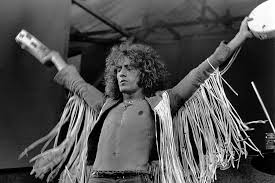
The Who was a groundbreaking band that came to popularity around the same time as the Beatles and Rolling Stones. Led by Roger Daltrey who had an energy, a range and power that neither of the other two bands possessed. Able to deliver rock classics such as Won’t Get Fooled Again and Baba O’Riley as well as the beautiful ballad Behind Blue Eyes, Daltrey was up for the task no matter what type of song Pete Townshend happened to write. Known for twirling his microphone high into the sky, Daltrey is one of rock’s most iconic and long lasting vocalists.
- Tony Harnell (TNT)
A lesser known vocalist known more by underground heavy metal and hard rock fans, Harnell has one of the highest voices in rock. Known mostly for fronting Norwegian band TNT, Harnell has an operatic vocal style with a soprano’s range. Harnell came on the scene as a metal singer, cranking out anthems such as Seven Seas and 10,000 Lovers in One. He evolved into a true singer, highlighted by masterpieces Tonight I’m Falling and Lonely Nights. A hard rock legend, even if under the radar, Harnell has also worked with the bands Morningwood, Westworld, Lovekillers, Starbreaker, and he spent some time in Skid Row, one of the few vocalists that could suitably replace Sebastian Bach.
- Ann Wilson (Heart)
The queen of rock, Ann Wilson is as strong of a singer as any alive. The voice behind Barracuda, Magic Man, What About Love and Crazy on You, Wilson can shriek like a horse or hold a note in perpetuity. Wilson has collaborated with rock vocalists such as Robin Zander of Cheap Trick and Mike Reno of Loverboy to create some of the classic movie ballads of the 80s.
- Graham Bonnet (Alcatrazz, Rainbow)
The man who had the indubitable task of replacing Ronnie James Dio in Rainbow decided to just be himself. Instead of trying to sound like Dio, Bonnet decided to do it “Graham style” and delivered Rainbow’s biggest hits to date in Since You Been Gone and All Night Long. He later fronted the Michael Schenker Band on the Assault Attack album which produced Desert Song and Dancer. His best work was when he founded his own band, Alcatrazz, the band that brought guitar prodigy Yngwie Malmsteen to national prominence. Bonnet has power and a very unique and recognizable voice that is still going strong at age 71.
- Jani Lane (Warrant)
Another talent of the hair metal generation, Jani Lane had the look of the more popular Brett Michaels but ten times the talent. No song is more indicative of the time then their super smash, Heaven, or the cheesy and forgettable Cherry Pie. All that aside, Jani Lane was a gifted songwriter and even more gifted vocalist with a wide range, a charismatic stage presence and the ability to sing ballads and hard rockers with equal grace and skill. He was a charismatic frontman who could command a crowd during every single minute of a performance. I Saw Red, Blind Faith and Sad Theresa are among Lane’s high water mark performances, and the lesser known Thin Disguise and Stronger Now might be his best.
- John Lennon (Beatles)
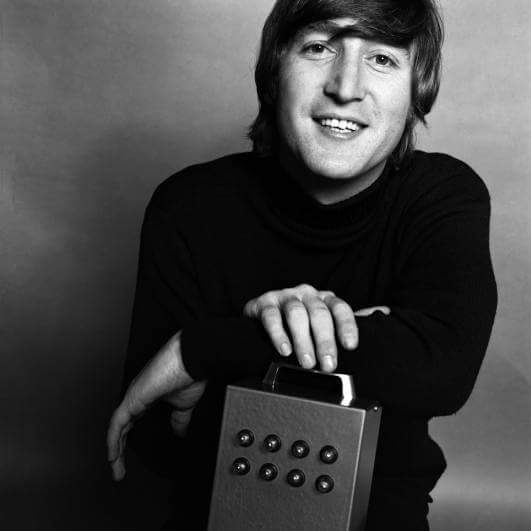
It’s John Lennon. Imagine a world without John Lennon. Or better yet, let’s not. To say that he and his bandmates started a musical revolution is an understatement. The Beatles re-wrote what it meant to be singers, songwriters and musicians, in general. They achieved greatness that has never been, nor ever will be, matched. That greatness was due in part to the fearless duo of Lennon & McCartney. Lennon has said he only ever wrote two “real” songs, cuts he considered to be autobiographical: Strawberry Fields and Help. Lennon didn’t need much help getting to – and staying at – the top of the charts, as well as the hearts and minds of music fans for generations.
- Mike Tramp (White Lion)
The man with the perfect hair, Mike Tramp had a voice to match during the height of the glam metal era. White Lion was the quintessential 80s hair metal band, bringing great songs, top notch musicianship and an unparalleled look. The band started and ended with the magical combination of guitarist Vito Bratta and vocalist Mike Tramp. Cranking out hits such as When the Children Cry, Wait and Tell Me, the band’s Pride album was a chart topper. Unlike many of their counterparts in the music scene, each band member was truly talented. Pride was the hit album but their best work could be found on their raw debut Fight To Survive and their fourth effort, Main Attraction.
- Harry Hess (Harem Scarem)
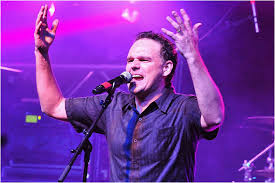
Harem Scarem is the greatest band most people have never heard. This Toronto, Ontario four-piece outfit can write hits as fast as Warren Buffet can make money. Yet, they’ve never achieved the mainstream success they so greatly deserve. There’s so much talent in this band, the three main band members: guitarist Pete Lesperance, Drummer Darren Smith and vocalist Hess each front their own bands outside of Harem Scarem. Hess is the master of the studio and can do things with his voice that few others can touch. Big Bang Theory, Weight of the World and United are the “must hear” albums from the Harem Scarem collection, but don’t pass up a chance to take a deep dive with Mood Swings, Change the World or the band’s self-titled debut.
31. David Coverdale (Whitesnake)
The man who broke on the scene as Ian Gillan’s replacement in Deep Purple (producing the hit Burn), Coverdale is best known for the band he founded, Whitesnake. The band had more lineup changes then Cher’s wardrobe, but no matter who surrounded Coverdale, he cranked out hit after hard rocking hit. And when a song didn’t become a hit, he re-released later until it did (see Crying in the Rain and Here I Go Again). Achieving success with Slide It In, Coverdale hit the big time with the release of the band’s self-titled 1987 masterpiece. Featuring Still of the Night, Bad Boys, Here I Go Again and Is This Love, Whitesnake was one of 1987’s biggest successes on the Billboard charts. It catapulted the band to sold out arena shows, with a supergroup consisting of guitarists Vivian Campbell and Adrian Vandenberg, bassist Rudy Sarzo and drummer Tommy Aldridge. Later, guitarist Steve Vai replaced Campbell and took the band to new heights. Coverdale achieved related fame by marrying Playboy playmate Tawny Kitaen who was the “Whitesnake” girl on several of the band’s overplayed videos.
- Andi Deris (Helloween)
Deris had to replace Helloween’s iconic vocalist Michael Kiske and somehow managed to pull it off. Helloween started off as a heavy metal band, and got even heavier with the addition of the powerful Deris. Ably handling the Kiske (and Hansen-era) vocals, and contributing a completely different and unique style of his own, Deris has helped Helloween achieve superstardom in Europe and South America, even if they never quite caught on in North America. It’s clearly North America’s loss, because Deris is one of the finest singers in, arguably, the greatest heavy metal band in the world.
- Ray Gillen (Badlands)
Ray Gillen’s story is short and somewhat tragic because he could have gone down as one of rock’s all-time greatest. Breaking onto the scene with Black Sabbath, he recorded an album known as Eternal Idol. Prior to its release, Sabbath founder Tony Iommi got word that Gillen was looking to put his own band together (later known as Badlands), and he cut the singer loose and had his vocals re-recorded by replacement vocalist Tony Martin. Gillen formed Badlands with guitarist Jake E. Lee and bassist Greg Chaisson, and the band was known for its hit Dreams In The Dark. Gillen’s vocals were Coverdale-esque, if not slightly better. He also appeared on an album by the project band Phenomena. Had he possessed a bigger catalog of work, he would likely have appeared much higher on this list. Gillen was a truly gifted vocalist.
- Billy Joel (Billy Joel)
The piano man and songwriting legend is also a formidable singer. While splitting his personality between the crooning piano balladier and the rocking guitar slinger of Glass Houses fame, Joel’s voice is identifiable, strong and timeless. He’s everyman’s singer; no frills, no strange effects and virtually no falsetto (with the exception of the oddball River of Dreams), Billy Joel could rock with the best of them while winning over the ladies by writing and singing some of music’s greatest love songs.
- Phil Lynott (Thin Lizzy)
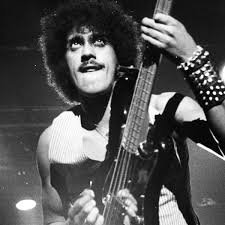
The black Irishman had a voice like none other, and he took full advantage of his uniqueness. Lynott’s Thin Lizzy is known for chart topping hits such as Boys Are Back In Town and Jailbreak, but it was some of the lesser known gems such as The Cowboy Song, Hollywood, Get Out Of Here and Thunder and Lightning that showcased Lynott’s greatness. A guest appearance on Gary Moore’s Out In The Fields solidified Lynott’s greatness. A formidable bassist and incredible songwriter, Lynott wrote songs that accentuated the uniqueness in his voice, creating timeless classics that live on long after he’s left us.
36. Sebastian Bach (Skid Row)
The man is more than just hair. Bach delivered some of the 80s strongest vocals, especially found on the chart-topping debut Skid Row album. Ranging from the anthemic Youth Gone Wild to the melancholy 18 and Life and back around to the sweet I Remember You, Bach has the vocal training, excellent tone and huge range to pull off a plethora of rock styles. If hair were a determinant in the rankings, he would certainly have ended up higher on the list.
- Jon Bon Jovi (Bon Jovi)
The master of the power ballad, Jon Bon Jovi delivered hits the way Wisconsin delivers cheese. Never Say Goodbye, I’ll Be There For You, Stick To Your Guns, Always; whenever there was a new Bon Jovi album, a hit power ballad was sure to follow. But he could also rock with the best of his era, cranking out gems such as Wild Is The Wind, In These Arms as well as the now tired radio hits Born To Be My Baby, Livin’ On A Prayer and Bad Medicine. Starting it all off with Runaway, Jon Bon Jovi is the poster child for the big hair glam metal era.
- Eric Adams (Manowar)
Despite these middle-aged men dressing like vikings and singing about conquering foreign lands in battle, Manowar’s lead singer, Eric Adams, deserves a spot on this list. There is no one with a stronger voice in all of rock. He can sing, he can scream, he can hold a note as long as he wishes. While the music itself can be somewhat one-dimensional, Adams has a voice unlike most. It would be interesting to see what he could do in a more mainstream heavy metal/hard rock band.
39. Jimi Jamison (Survivor)
While he didn’t appear on Survivor’s biggest hit, Eye of the Tiger, Jamison was the voice on all subsequent hits. The album Vital Signs is an all-time rock classic, an album from which any song could – and should – have been a top 10 hit. I Can’t Hold Back, High on You and The Search Is Over were the hits from this album, yet the highlights of the album are the non-hits, Everlasting and I See You In Everyone. The follow up, When Seconds Count, picked up right where Vital Signs left off sonically and hit-wise; sounding like it may have been recorded at the same time as Vital Signs. That album delivered Is This Love and Rebel Son. Too Hot To Sleep continued the trend, but to a lesser degree, with minor hits Desperate Dreams and Didn’t Know It Was Love. Burning Heart, from 1985’s Rocky IV, was another signature smash for the group. Jamison got his start with a band called Cobra which featured future-Asia guitarist Mandy Meier.
- Luke Spiller (The Struts)
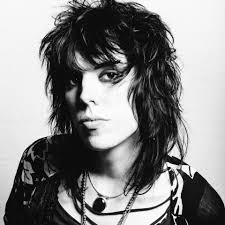
Arguably the most interesting vocalist and band to come out of the 2010-era, Luke Spiller is a bit of a chameleon. He molds his voice to each song and often sounds like a completely different singer. One moment, he sounds like Steven Tyler while the next he’s the second coming of Freddie Mercury. In any case, Spiller brings energy, vibrancy, excitement and a throwback attitude to when vocalists simply tried harder.
- Butch Walker (Marvelous 3)
It would be remiss to not include the multi-talented Butch Walker on a list of great singers. The man of many voices, Walker is a bit of an enigma. Emerging onto the scene as a lead guitarist, not a vocalist, Walker morphed from a “lead guitarist” to a “lead vocalist who plays guitar.” And the transition was flawless. All the while, he also became a notable and reputable producer. His first foray into being a lead vocalist came with his band Marvelous 3, which, to many, would be considered a one-hit wonder (Freak of the Week). But that was no fault of Walker, he produced three albums full of hits, even if the record company and the public didn’t particularly notice. After going solo, his vocal prowess increased significantly. Walker expanded his hand at different musical styles and genres, each one building his vocal resume. Stay Gold is a highlight for showcasing Walker’s vocals, as is Left Of Self Centered.
- Mike Reno (Loverboy)
Absolutely forgettable tennis headband aside, Mike Reno took his band to the top. Having produced hits the way Sammy Hagar sells tequila, Reno’s voice was all over the early 1980s radio. Top 40 hits, movie soundtracks or duets with Ann Wilson, commercial radio turned Reno and Loverboy loose for a while which really wasn’t a bad thing.
- Eric Martin (Mr. Big)
While known mostly for the smash hit To Be With You, Eric Martin and his band Mr. Big are certainly not one trick ponies. The band stayed somewhat under the radar but still charted with Just Take My Heart, Daddy Brother Little Boy and Strike Like Lightning. Singing in front of virtuosos Paul Gilbert (guitar) and Billy Sheehan (bass), Martin had to be good, and he more than held his own. Martin has also released several solo albums, spawning the radio friendly These Are The Good Times.
- Paul Rodgers (Bad Company)
The voice of Bad Company, Rodgers was anything but a Shooting Star. He doesn’t have an outstanding range, and for that matter, his style may be somewhat one dimensional, but he may very well be “the voice” of the classic rock era. There cannot be a list of great rock singers without Mr. Rock n Roll Fantasy.
- Vince Neil (Motley Crue)
If Neil were to be judged by Motley Crue’s debut album alone, he would have undoubtedly made the top 20. However, for all the beauty, balls and sheer coolness of tracks such as Public Enemy #1, Starry Eyes and On With the Show, we’ve also had to endure Girls, Girls, Girls, Dr. Feelgood and You’re All I Need. The facts of life state that you take the good with the bad, and with the exception of Neil’s first five or so hungry years, it was more of the latter.
- Elvis Presley
Elvis didn’t have much of a range compared to others on this list, but he was Elvis. The king. Responsible for carving out the genre known as rock’n’roll, along with fellow pioneers Chuck Berry and Little Richard, no one commanded a stage the way Elvis could. His take on the old Italian opera classic O Sole Mio, 1960’s It’s Now Or Never sold an astonishing 20 million units! What he may have lacked in range, the old Hound Dog makes up for in hits, cool factor and everlasting legacy.
- Aldo Nova
Life is just a fantasy, can you live the fantasy life? Aldo Nova did in the early 80s, and one can make the claim that he, along with April Wine, ushered in the glam hard rock era. With a little less hairspray than those who followed, Nova got by on energy, catchy songs and a great voice. While he never captured the mainstream success that he achieved on the eponymous debut release, he put out four solid albums including the unheralded (and fantastic) Blood on the Bricks, an album co-written with Jon Bon Jovi.
- Ronnie Atkins (Pretty Maids, Nordic Union)
A lesser known vocalist among the mainstream but a legend and icon among those who love European hard rock and heavy metal, Ronnie Atkins is the voice that identifies this genre. The brainchild behind his main act, Pretty Maids, and his sideband, Nordic Union, Atkins freely moves between his signature growl and a beautiful tenor tone that define his uniqueness. Check out “Last Beauty on Earth” side by side with “Future World” to see the talent and vocal diversity Atkins brings to the rock world.
- Don Dokken (Dokken)
Dokken’s inclusion is based entirely on his extensive and impressive collection of studio work. If this list were based solely on live performance, Dokken would come somewhere between a cat in heat and a pack of howling coyotes. Thankfully, Don Dokken has produced some of the hair metal genre’s greatest work, none better than what was found in the trilogy of 80s classics: Tooth and Nail, Under Lock and Key and Back For The Attack. At some point, hopefully Dokken will realize that his contribution to the world needs to focus on releasing new material and leave the live performances to someone that can actually still perform live.
- Glenn Hughes (Deep Purple, Black Sabbath, John Norum)
The chameleon has been killing it in rock circles for more than 45 years with no signs of slowing down. Glenn Hughes has fronted Deep Purple, Black Sabbath and guitar prodigy John Norum’s band. He bobs and weaves and morphs his voice fluidly with whatever project he is with at the time. No man has had so many unique sounds as Hughes. Teaming up with Pat Thrall, he released the beautiful, falsetto driven “Look In Your Eyes” that was a minor MTV hit in the early 80s. After his Sabbath stint, he teamed up again with his friend Iommi to do a Hughes/Iommi album producing a few memorable tracks. According to Tony Iommi’s book, Hughes may have also consumed more cocaine than anyone in rock and roll history. Maybe that’s why he still has all this energy all these years later?
What do you think? Let’s hear your thoughts! Check out more music insights at www.Brewsician.com
Dave Clark is a performing musician and recording artist who loves to write about fun and interesting topics, especially music and craft beer. Check out www.Brewsician.com to see more blogs or go to www.DaveClarkMusician.com to catch a live show in your area.

